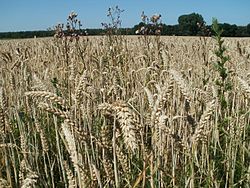kvieši
Hello, you have come here looking for the meaning of the word kvieši. In DICTIOUS you will not only get to know all the dictionary meanings for the word kvieši, but we will also tell you about its etymology, its characteristics and you will know how to say kvieši in singular and plural. Everything you need to know about the word kvieši you have here. The definition of the word kvieši will help you to be more precise and correct when speaking or writing your texts. Knowing the definition ofkvieši, as well as those of other words, enriches your vocabulary and provides you with more and better linguistic resources.

Kvieši
Latvian

Etymology
From an earlier *kvietis (plural kvieši, genitive *kvietya > kvieša, from which a new singular kviesis was formed by analogy), from Proto-Baltic *kʷiet-, from Proto-Indo-European *kʷeyt- (“to shine; bright; white”), from a stem *kew-, *ḱew- (“to shine; bright”) with an extra -t. The original meaning was probably “light, bright one” > “wheat,” given its color. Cognates include Lithuanian kviečiaĩ, singular kvietỹs, Proto-Germanic *hwaitijaz (Old Norse hveiti, Norwegian kveite, Old High German weizi, German Weizen, Old English hwæte, English wheat).[1]
Pronunciation
Noun
kvieši m (2nd declension)
- wheat (esp. Triticum aestivum)
- kviešu milti ― wheat flour
- kviešu maize ― wheat bread
- kviešu lauks ― wheat field
- sēt kviešus ― to sow wheat
- pļaut kviešus ― to mow wheat
Usage notes
There is a singular form kviesis, only sporadically attested (usually to refer to the plant). There is also a family name Kviesis.
Declension
Declension of kvieši (2nd declension)
| singular (vienskaitlis) | plural (daudzskaitlis) | |
|---|---|---|
| nominative (nominatīvs) | — | kvieši |
| genitive (ģenitīvs) | — | kviešu |
| dative (datīvs) | — | kviešiem |
| accusative (akuzatīvs) | — | kviešus |
| instrumental (instrumentālis) | — | kviešiem |
| locative (lokatīvs) | — | kviešos |
| vocative (vokatīvs) | — | kvieši |
References
- ^ Karulis, Konstantīns (1992) “kvieši”, in Latviešu Etimoloģijas Vārdnīca (in Latvian), Rīga: AVOTS, →ISBN
